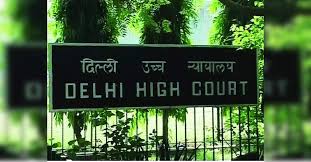
Delhi High Court: DRTs Cannot Cancel Registered Sale Deeds Under SARFAESI Act, Civil Courts Retain Jurisdiction
Court restores civil suit, clarifies limits of Section 34 SARFAESI Act in property disputes
Judgment ensures balance between debt recovery laws and civil rights of property owners
By Our Legal Reporter
New Delhi: November 14, 2025:
In a landmark ruling, the Delhi High Court has clarified the scope of Section 34 of the SARFAESI Act, 2002, holding that Debt Recovery Tribunals (DRTs) cannot adjudicate disputes involving the cancellation of registered sale deeds. The Court restored a civil suit that had been dismissed at the inception stage, emphasizing that such matters fall squarely within the jurisdiction of civil courts.
Also Read: Allahabad High Court Calls Cybercrime a ‘Silent Virus’, Denies Bail in Fake GST Transaction Case
This judgment is significant because it resolves a long-standing confusion about the powers of DRTs under the SARFAESI Act, which was enacted to streamline debt recovery for banks and financial institutions.
Background of the Case
The case involved a dispute where a borrower challenged the validity of a registered sale deed executed in favour of a third party. The trial court had dismissed the suit at the very beginning, citing Section 34 of the SARFAESI Act, which bars civil courts from interfering in matters where DRTs have jurisdiction.
The borrower appealed, arguing that cancellation of registered sale deeds is not within the scope of DRTs. The Delhi High Court agreed, ruling that civil courts retain jurisdiction over such matters.
Key Observations by the Court
- Section 34 SARFAESI Act: This provision bars civil courts from interfering in matters that fall under the jurisdiction of DRTs. However, the Court clarified that this does not extend to cancellation of registered sale deeds.
- Jurisdiction of DRTs: DRTs are specialized tribunals created to handle debt recovery cases. They do not have powers to cancel or declare sale deeds void.
- Civil Courts’ Role: Matters involving property rights, ownership disputes, and cancellation of registered documents remain within the domain of civil courts.
- Restoration of Suit: The Court restored the civil suit that had been dismissed, allowing the matter to proceed before the appropriate forum.
Also Read: Delhi High Court Slams Income Tax Department for 3-Year Delay, Orders Refund with Interest
Why This Judgment Matters
- Clarity in jurisdiction: It clearly defines the limits of DRTs’ powers under the SARFAESI Act.
- Protection of property rights: Property owners retain the right to approach civil courts for disputes involving ownership and sale deed cancellation.
- Balance between debt recovery and civil law: The judgment ensures that debt recovery mechanisms do not override fundamental civil rights.
- Precedent for future cases: This ruling will guide lower courts and litigants in similar disputes across India.
Also Read: Delhi High Court Ends 38-Year-Old Will Dispute, Upholds Validity of Testamentary Document
Impact on Stakeholders
- For borrowers and property owners: They now have clarity that disputes over registered sale deeds must be taken to civil courts, not DRTs.
- For banks and financial institutions: While SARFAESI remains a powerful tool for debt recovery, its scope is limited to enforcement of security interests, not property ownership disputes.
- For the judiciary: The ruling reduces confusion and ensures proper allocation of cases between civil courts and DRTs.
Legal Context
The SARFAESI Act (Securitisation and Reconstruction of Financial Assets and Enforcement of Security Interest Act, 2002) was enacted to empower banks to recover debts without lengthy court procedures. Section 34 restricts civil courts from interfering in matters covered by DRTs.
However, the Delhi High Court clarified that DRTs cannot cancel registered sale deeds, as this involves property rights beyond debt recovery. This interpretation aligns with earlier Supreme Court rulings that emphasized the limited jurisdiction of DRTs.
Expert Reactions
- Property lawyers say the ruling protects civil rights and prevents misuse of debt recovery laws.
- Banking experts acknowledge that while the judgment limits DRT powers, it ensures fairness in disputes involving third-party property owners.
- Academics note that the decision strengthens the constitutional principle of access to civil courts for property disputes.
Broader Implications
Also Read: ITAT Bangalore Rules Mango Orchard Income as Agricultural, Quashes ₹1.2 Crore Tax Addition
- Encourages fair litigation: Borrowers and property owners can challenge sale deeds without fear of jurisdictional confusion.
- Strengthens rule of law: Reinforces the principle that specialized tribunals cannot override civil courts in matters of property rights.
- Guides future reforms: The judgment may influence future amendments to debt recovery laws, ensuring clearer boundaries between tribunals and civil courts.
Conclusion
Also Read: ITAT Bangalore Rules Mango Orchard Income as Agricultural, Quashes ₹1.2 Crore Tax Addition
Also Read: Bombay High Court Bars ‘The New Indian Express’ from Using Trademark Outside South India
Also Read: Bombay High Court Bars ‘The New Indian Express’ from Using Trademark Outside South India
The Delhi High Court’s ruling is a landmark in clarifying the scope of Section 34 of the SARFAESI Act. By holding that DRTs cannot cancel registered sale deeds, the Court has ensured that civil courts remain the proper forum for property disputes.
This judgment balances the need for efficient debt recovery with the protection of civil rights, setting a strong precedent for future cases.
🔑 Suggested Keywords for SEO & Faster Searches
- Delhi High Court SARFAESI Act judgment
- Section 34 SARFAESI Act jurisdiction
- DRT powers sale deed cancellation
- Civil court jurisdiction property disputes
- SARFAESI Act Delhi HC ruling
- Debt Recovery Tribunal limitations India
- Registered sale deed cancellation India
- Delhi HC restores civil suit SARFAESI
- Property rights vs debt recovery India
- SARFAESI Act legal interpretation Delhi High Court
Also Read: Supreme Court: Tenants Must Pay Rent Despite Pending Appeal, No Relief Without Stay Order